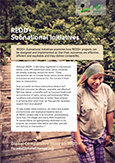Assessment of jurisdictional sustainability across the tropics
Jurisdictional approaches are a type of integrated landscape management with high levels of government involvement, leading to comprehensive governance of forest and land use across entire political territories. Such approaches offer important opportunities to link forest carbon finance, sustainable supply chain initiatives and domestic policies, and, across the tropics, many subnational governments are advancing juridicational approaches to REDD+ and low emissions development.
Since 2018, GCS REDD+ has collaborated with Earth Innovation Institute, the Governor’s Climate and Forests Task Force (GCF-TF) and the Climate Community and Biodiversity Alliance (CCBA) to track and assess subnational jurisdictions’ progress towards sustainability.
Researchers assessed sustainability commitments; key policies and programmes to address deforestation and forest degradation; sustainable supply chain initiatives; REDD+ projects; and multi-stakeholder forums in 39 jurisdictions in 12 tropical countries. They also addressed the challenges and opportunities for making progress. Results were published in a global report, and there are profiles for each study jurisdiction. The assessment was complemented by implementation of the CCBA Sustainable Landscapes Rating Tool (SLRT) in GCF-TF member states and provinces in Brazil, Peru, Mexico, Ecuador, Côte d’Ivoire and Indonesia, and support to the Sustainable Districts Association of Indonesia in assessing district-level progress.
Evaluating the impacts of REDD+ on forests and people
A UNFCCC call for “demonstration activities” in 2007 led to an early proliferation of hundreds of local REDD+ projects, which were mostly implemented by NGOs or for-profit companies with an orientation toward voluntary carbon markets and a focus on smallholders or small-scale forest users. Rigorous evaluation of these early initiatives can help understand which forest-based actions work best – including where, when, why and at what cost – to promote learning and inform higher-level REDD+ policy design and implementation.
Through GCS REDD+, CIFOR built a long-term multi-site study to evaluate the impacts of these early REDD+ initiatives on forest conservation (forest cover, land use change) and local livelihoods (income, assets, tenure security and perceived well-being). The work focuses on 22 initiatives in six countries (Brazil, Peru, Cameroon, Tanzania, Indonesia and Vietnam), and combines socioeconomic surveys in 150 villages and nearly 4,000 households (including control groups) with Global Forest Change data (2000-15), measuring the effect of REDD+ interventions on a set of common outcome indicators.

Three rounds of panel data were collected. The first round of data was collected in 2010-12 (pre-intervention), the second in 2013-14 (early post-intervention), and the third in 2018 to consolidate evaluated post-intervention impacts.
Findings to date highlight some important impacts: First, more than half of the REDD+ initiatives reduced deforestation at the community level, although with small effect sizes. Second, no systematic negative impacts of REDD+ on local welfare was observed at these sites, with some site-level evidence of significant livelihood benefits. Third, it is clear that sensitive and systemic issues such as land tenure insecurity cannot be fully addressed at the project scale. For instance, while REDD+ interventions did not worsen smallholder tenure insecurity, there is little evidence that project level efforts to address tenure security produced positive results. Fourth, while there are examples of REDD+ projects enhancing women’s participation in village decision-making, there is also evidence that implementers could do more to promote gender equality and safeguard women’s rights. Finally, incentives for smallholders and communities (e.g. payments or infrastructure) significantly alleviated the burdens of land use restrictions (e.g. through law enforcement, protected areas) associated with some REDD+ initiatives.
International Database of REDD+ Projects and Programs
The International Database of REDD+ Projects and Programs (ID-RECCO) has been hosted by CIFOR since 2018. It is a rich dataset that consolidates public information on more than 600 REDD+ projects and jurisdictional REDD+ programs (of which 416 are currently active).
The database was last updated in December 2020 (version 4.1) and can be accessed here.









